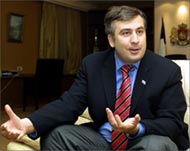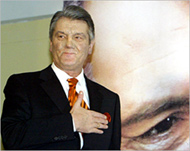Putin hosts leaders of ex-Soviet states
Russian President Vladimir Putin has hosted leaders of an alliance of former Soviet states, beginning three days of summits and glittering parties he hopes will lift his international image.

The high point of the 8-10 May ceremonies will be Monday’s 60th anniversary of the Soviet defeat of Nazi Germany in the second world war, attended by more than 50 leaders, among them US President George Bush and German Chancellor Gerhard Schroeder.
The gatherings come after stinging criticism by the United States of what it sees as Putin’s excessively strong grip on power and concerns over the risks of investing in Russia, rooted in uncertainty over the application of laws.
Russia has had to watch its influence, in a region where it once held absolute sway, steadily erode as former Soviet states shift allegiance from Moscow and towards a welcoming and more financially alluring West.
Russia losing control
The Commonwealth of Independent States (CIS) joins 12 of the 15 old Soviet republics, stretching from Central Asia on the border with China to the edge of the European Union, with a combined population of 280 million – half of it in Russia.
 |
|
Saakashvili is boycotting the |
They are ruled by an unlikely mix of leaders, most of whom trace their political roots to the Soviet days, and who rose to power in elections internationally criticised as flawed at best.
At one end of the political spectrum are the autocratic rulers of much of Central Asia, including Turkmenistan’s President Saparmurat Niyazov, who has built up a bizarre personality cult, and Belarus’s Alexander Lukashenko, who heads what Washington calls Europe’s last dictatorship.
Most have made plain that they will not ease their grip and allow the ”people power” revolutions that brought pro-Western leaders to office in Georgia and Ukraine.
Georgia spat
Tiny Moldova, too, is slipping out of Russia’s orbit with its president, Vladimir Voronin, and the only official communist leader in the CIS, saying he wants greater integration with the the West.
Georgia will be the last port of call for Bush on his tour of the region that began in the Baltic states, also once part of the Kremlin empire but which, as EU members now, are pressing Moscow to atone for decades of Soviet oppression.
 |
|
Yushchenko is planning to |
It will confirm Kremlin alarm that Washington is stepping a little too eagerly into its former domain. On Saturday, Bush rubbed salt into the wound by saying the Baltic states were an example of democracy for Russia.
Georgian President Mikhail Saakashvili – who came to power in the ”Rose Revolution” in late 2003 – is boycotting the Moscow festivities after failing to reach a deal late last week with Russia to quickly dismantle Soviet-era bases on Georgian soil that he calls a form of occupation.
Azeri President Ilham Aliyev is also staying at home rather than meet Armenian leader Robert Kocharyan on 8 May, which is also the anniversary of a decisive defeat of Azeri forces in the war over Nagorno-Karabakh, one of the bloodiest conflicts to erupt in the dying days of the Soviet Union.
Past glory
But Ukraine’s President Viktor Yushchenko, who came to power in the last ”Orange Revolution” and defeated the candidate openly backed by Putin, will attend the CIS meeting.
Putin, who dismisses suggestions that the group is an attempt by the Kremlin to hang on to past glory, says the CIS still has value.
“(It is) a very important instrument that helps us to exchange information, to solve common political, humanitarian and administrative problems. We … must not lose this,” he said recently.
A key goal of the CIS has been to try to resume trade ties and re-create what it calls a single economic space; but the latest statistics show that the group accounts for just 17% of Russia’s exports and 21% of its imports.